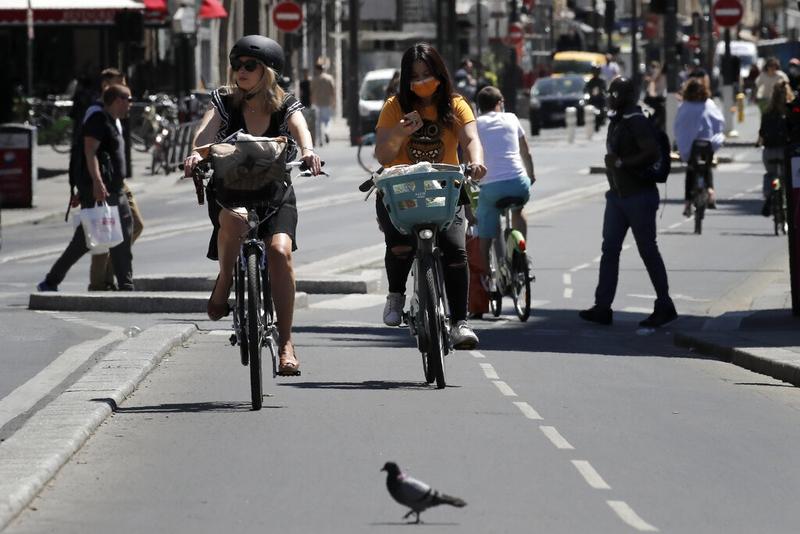 People cycle on Rivoli street in Paris, France, on May 20, 2020 as France gradually lifts its COVID-19 lockdown. (CHRISTOPHE ENA / AP)
People cycle on Rivoli street in Paris, France, on May 20, 2020 as France gradually lifts its COVID-19 lockdown. (CHRISTOPHE ENA / AP)
Lockdown orders prompted by the spread of COVID-19 helped prevent roughly 60 million infections in the United States and 285 million in China, and they averted approximately 3.1 million deaths across Europe, according to two studies published by the British scientific journal Nature.
The two studies published in Nature on Monday were done by the University of California, Berkeley, and Imperial College London.
The two reports used different methods to reach similar conclusions. They suggested that the aggressive and unprecedented shutdowns, which caused massive economic disruptions and job losses, were effective at halting the exponential spread of COVID-19.
In discussing their findings online on Monday with reporters, the leaders of the two research teams said challenges existed in crafting their models and thus there are uncertainties in the final estimates.
Lockdown orders helped prevent roughly 60 million infections in the United States and 285 million in China, and they averted approximately 3.1 million deaths across Europe, according to two studies published by the British scientific journal Nature
Ian Bolliger, one of the Berkeley researchers, acknowledged the difficulty in obtaining reliable infection numbers given the haphazard pattern of testing. Both research teams said the peer review process had made their findings more robust.
The study done by the Berkeley team estimated how 1,717 interventions, such as stay-at-home orders, social distancing measures, business closings and travel bans from January through April 6 affected the spread of the virus in six countries: China, South Korea, Italy, Iran, France and the US.
ALSO READ: Scientists assess lockdowns' effects, cite drastic social distancing
The study said that emergency COVID-19 policies prevented or delayed roughly 530 million total coronavirus infections across all six countries. The researchers didn't estimate how many deaths might have been prevented.
Role of policies
The study's lead author, Solomon Hsiang, director of the Global Policy Laboratory at UC Berkeley, said in a news release on Monday: "Without these policies employed, we would have lived through a very different April and May."
His team estimated that, in the initial days after the virus was seeded in each country, and before the shutdowns, the numbers of infections were doubling every two days.
The second study, published by epidemiologists at Imperial College London, examined deaths across 11 European countries. It said that lockdown orders and school closures in response to the pandemic may have averted about 3.1 million deaths through early May in Austria, Belgium, Denmark, France, Germany, Italy, Norway, Spain, Sweden, Switzerland and the UK.
The study suggested that across those countries, between 12 million and 15 million people had been infected with the virus through May 4, representing between 3.2 percent and 4 percent of the population.
"It is clear to us that non-pharmaceutical interventions-such as the lockdown and school closures-have saved about 3.1 million lives in these countries," said Seth Flaxman, a senior lecturer in mathematics at Imperial College London who worked on the study, on Monday.
READ MORE: WHO warns lifting of virus lockdowns must be gradual
The overwhelming majority of people remain susceptible to the virus, said Samir Bhatt, senior author of the Imperial study. Only about 3 percent to 4 percent of people in the countries being studied have been infected to date, he said.
"This is just the beginning of the epidemic: we're very far from herd immunity," he said on Monday. "The risk of a second wave happening if all interventions and precautions are abandoned is very real."
Meanwhile, the World Health Organization clarified on Tuesday that people infected with the virus but not showing symptoms can and do pass it on to others. But the WHO said it still doesn't know how common that form of transmission is.
The agency responded one day after its top expert, Maria Van Kerkhove, said transmission of the coronavirus by people who don't have symptoms is "very rare", but then said on Tuesday it was a "misunderstanding" to say asymptomatic transmission is rare globally.
Van Kerkhove made the original comment during a WHO online news conference. "I was just responding to a question; I wasn't stating a policy of WHO or anything like that," she said.
READ MORE: WHO now says role of silent virus spreaders remains unclear


